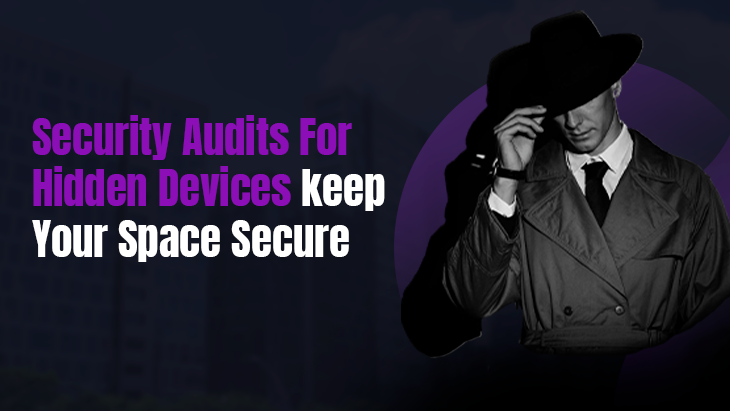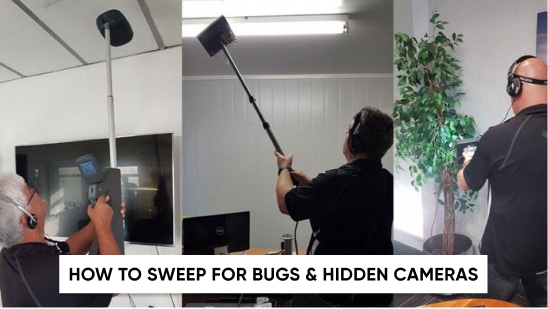In the technologically advanced world of today, privacy is becoming a major concern for both people and companies. The growth of digital espionage and the accessibility of reasonably priced monitoring gear increase the likelihood of covert surveillance devices violating your privacy. Ensuring the protection of your privacy is crucial, regardless of whether it’s in your house, workplace, or any other personal or professional space.
A crucial component of contemporary security procedures are security audits that look for concealed devices. The necessity to safeguard private, professional, and governmental areas has increased with the development of covert cameras, microphones, and GPS trackers. Security audits for concealed devices are useful in this situation. The purpose of these audits is to locate and remove any unapproved monitoring equipment, ensuring the privacy of sensitive data and the security of personal areas.
2. What is a Hidden Device Security Audit?
An extensive examination of a location to find and eliminate illegal surveillance tools, such as GPS trackers, hidden cameras, microphones, and listening devices, is known as a security audit for concealed devices. Qualified security specialists frequently carry out these audits using specific equipment and technologies designed to detect hidden gadgets that are difficult for the uninformed eye to spot.
Types of Hidden Devices Typically Found
There are many different types of covert monitoring tools, but the following list includes some of the most popular ones:
- Hidden cameras: These cameras can record audio and video without the subject’s knowledge. Commonplace items like clocks, smoke alarms, or even air purifiers frequently conceal these cameras.
- Audio bugs and microphones are tools for listening in on conversations. Desks, walls, or even electronics like laptops and phones may conceal audio bugs and microphones.
- GPS trackers: Commonly installed in cars, these gadgets monitor people’s whereabouts and assets, endangering the safety and mobility of individuals or organizations.
How Security and Privacy Are Compromised by Hidden Devices
The existence of covert monitoring equipment can seriously jeopardize the privacy of individuals and organizations. Unauthorized recording of personal or intimate moments can occur in houses equipped with covert cameras and microphones. These gadgets have the potential to record private information in a business setting, such as trade secrets, financial information, or strategic plans, which could result in corporate espionage and substantial financial damage.
Such breaches can have disastrous consequences, such as identity theft, data breaches, or harm to one’s reputation. A comprehensive security audit is helpful to ensure the detection and removal of these covert devices before they cause irreversible damage.
Why You Should Consider a Security Audit
Security audits are crucial for protecting privacy and securing both personal and professional environments, despite their sometimes overlooked importance. This is the reason why:
Individual Privacy
It’s getting harder and harder to maintain personal privacy in the era of smart devices and ubiquitous technology. Despite the headlines about hidden cameras in residences, vacation rentals, and Airbnbs, people often remain unaware that they are under surveillance. Ensure the protection of your family, house, and personal items from prying eyes by conducting a security assessment for concealed devices.
Business Security
Businesses handle sensitive data, including financial and intellectual property information, on a large scale. Unauthorized observation, such as the use of covert cameras or microphones, can result in corporate espionage, which can involve the theft of trade secrets or the disclosure of company plans to rivals. A security audit guarantees the confidentiality of critical corporate information, safeguarding the business’s finances and excellent name.
Government and Corporate Concerns
When it comes to spying, well-known institutions like governments and businesses are even more vulnerable. These organizations face greater risks, as the loss of sensitive or classified data could result in financial failure, public mistrust, or national security issues. Their security policies would not be complete without security audits, which offer an extra line of protection against espionage.
Examples of Security Breach Incidents Using Hidden Devices
- Hotel Surveillance Scandals: In a number of well-publicized incidents, visitors found concealed cameras in their rooms, which were secretly recording them.
- Corporate Espionage: Several businesses suffered financial losses after rivals discovered covert listening devices in boardrooms, enabling them to steal strategic planning.
- Government Surveillance Leaks: There have been instances where covert devices have infiltrated government buildings, posing a threat to national security and causing the leakage of confidential material.
Common Areas Vulnerable to Hidden Devices
Although one can install covert monitoring equipment practically anywhere, some spaces are more susceptible than others. The following areas are some of the most typical places to find concealed devices:
Houses and flats
- Bedrooms: Installing audio bugs or hidden cameras can violate privacy.
- Living Rooms: Installing surveillance equipment in living rooms allows for the recording of private conversations or actions.
- Home Offices: Installing covert devices at home offices could compromise private information like financial data or confidential business discussions.
Companies and Workspaces
- Conference rooms frequently host important corporate meetings and strategy discussions, making them prime locations for the installation of covert cameras or bugs.
- Boardrooms: Important business decisions are made in these spaces, which can draw corporate spies looking to steal sensitive data.
- Employee Workspaces: Workplace surveillance equipment can record interpersonal interactions, monitor computer activity, and record conversations.
Public Spaces
- Public Areas: Researchers have found hidden cameras and listening devices in hotel rooms, endangering the privacy of guests.
- Rental Cars: It is possible to trace the whereabouts of famous people or business leaders by installing GPS trackers or listening devices in rental cars.
- Temporary Offices: Companies that rent temporary office space face the risk of competitors or past tenants observing them.
How to Find Hidden Devices during a Security Audit
A professional detective agency uses sophisticated technology and experience to find covert surveillance equipment. This is how the procedure normally operates:
- Instruments and technology Radio Frequency (RF) Detectors: These devices detect radio signals emitted by security devices such as microphones and cameras.
- Security equipment frequently produces heat, which thermal imaging cameras use to detect. This is very helpful for finding hidden electronics inside furniture or behind walls.
- Equipment for Technical Surveillance Counter-Measures (TSCM): This includes specialized equipment that finds hidden electronic components in objects, such as non-linear junction detectors.
Expert vs. DIY Security Audits
Although kits for do-it-yourself bug identification are available, professional security assessments tend to yield greater results. Experts have the knowledge and resources necessary to carry out a comprehensive and efficient property sweep, including access to more sophisticated equipment. Do-it-yourself kits may overlook more advanced or deviously disguised devices, leaving your room vulnerable.
The Procedures for Carrying Out a Comprehensive Audit
- First Evaluation: In order to comprehend possible threats and pinpoint weak points, the security specialist will carry out a preliminary evaluation.
- The specialist will sweep the area for concealed gadgets such as GPS trackers, microphones, and cameras using a variety of instruments, including thermal imaging and RF detectors.
- Finding Potential Threats: If a security specialist finds any devices, they will assess the potential risk they pose and recommend the most effective removal strategy.
Advantages of Consistent Security Audits
Whether for personal or business use, regular security audits have the following important advantages:
Preserving Secrecy
Security audits assist in preserving privacy in both personal and professional settings by finding and eliminating concealed devices that would otherwise jeopardize security.
Preventing Corporate Espionage and Data Theft
Security audits are a crucial preventative tool against corporate espionage and data theft for firms. Businesses can stop rivals from accessing trade secrets or financial data by promptly recognizing surveillance equipment.
Maintaining Mental Calm
Regular security audits offer peace of mind, whether you are safeguarding your residence or place of business. You can move about your place without worrying that you’re being seen or overheard because you know it’s not under monitoring.
What a Professional Security Audit Should Include
You should anticipate a thorough inspection and an in-depth report when you work with a professional security audit provider. This is how the procedure usually goes:
Synopsis of the Procedure
- Employing a Specialist: The initial action should be to work with a security specialist or company that specializes in finding hidden devices. One way to accomplish this is to look for businesses that have expertise with Technical Surveillance Countermeasures (TSCM).
- Performing the Audit: The specialist will come to your house, place of business, or workplace and use specialized equipment to perform a comprehensive sweep.
- Getting a Report: Following the audit, the specialist will send over a comprehensive report including all devices discovered, whereabouts, and security-enhancing suggestions.
Services Provided and Associated Costs
The size of the area under investigation, the level of danger, and the types of equipment used all influence the cost of a professional security audit. Depending on the extent, a comprehensive security audit for a company may cost anything from a few hundred to several thousand dollars on average.
How to Choose the Right Security Audit Service Provider
It’s crucial to take into account a security audit service provider’s credentials, experience, and customer reviews while making your decision. Seek out a supplier with TSCM experience and a track record of completed audits.
Signs You Might Need a Security Audit
If you suspect a privacy violation, it’s crucial to schedule a security audit or hire expert TSCM services provider as soon as possible. The following indicators suggest that you might need a security audit:
- Suspicion of Being Monitored: It’s crucial to get your space investigated for concealed devices if you have any suspicions that someone is observing or listening to you.
- Unusual Devices or Sounds: A security audit can assist in identifying the presence of surveillance devices if you discover unusual equipment in your home or place of business or hear strange noises during meetings or phone conversations.
- Leakage of Secret Information: If unjustified disclosure of private information occurs, it may indicate the presence of covert monitoring equipment.
Final Thoughts
Security audits for concealed devices are a crucial tool for safeguarding both private and public areas in a world where security and privacy are under constant threat. Regular security audits can help you stay ahead of potential dangers, whether your worry is corporate espionage or you just want to make sure your house stays a private haven.



